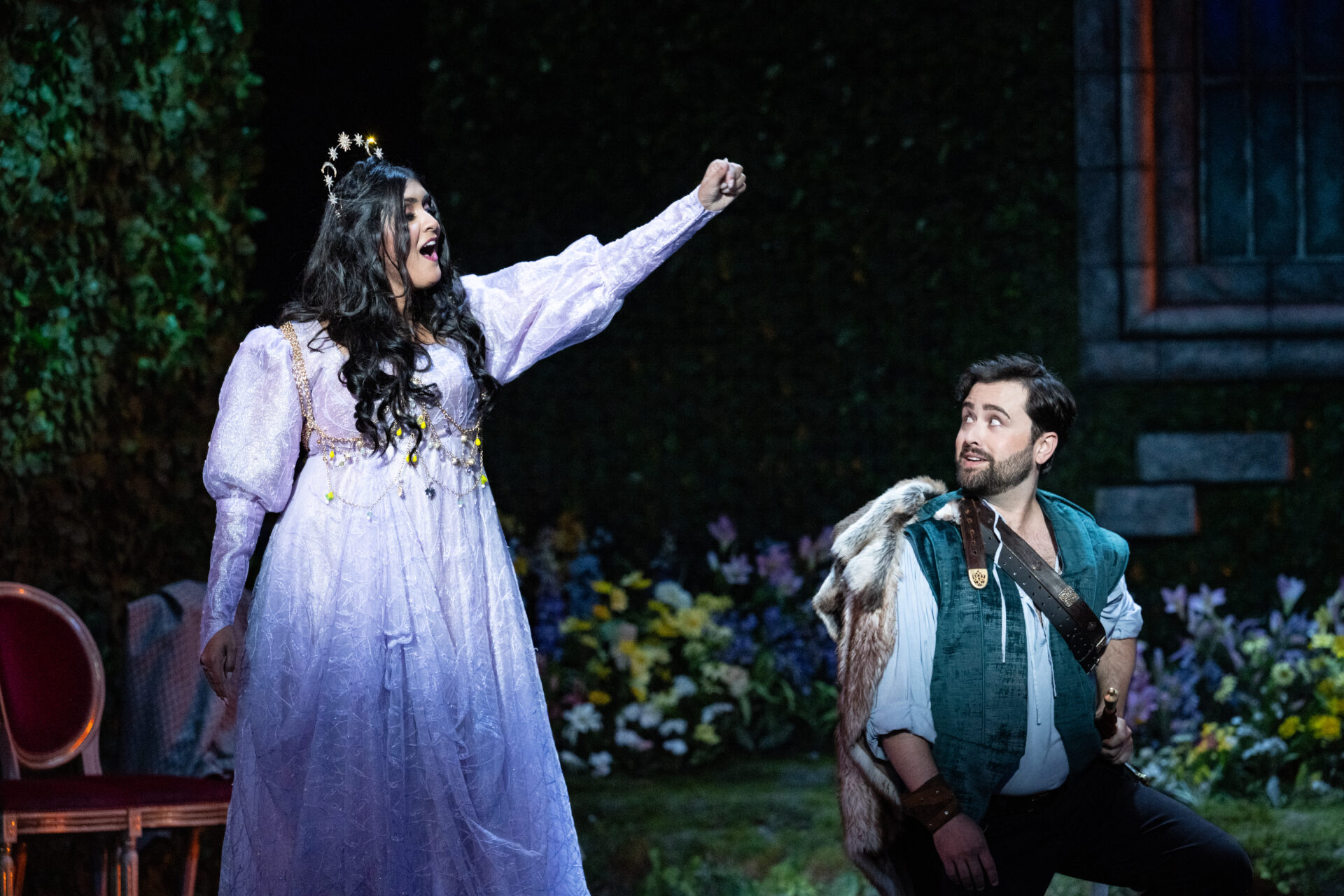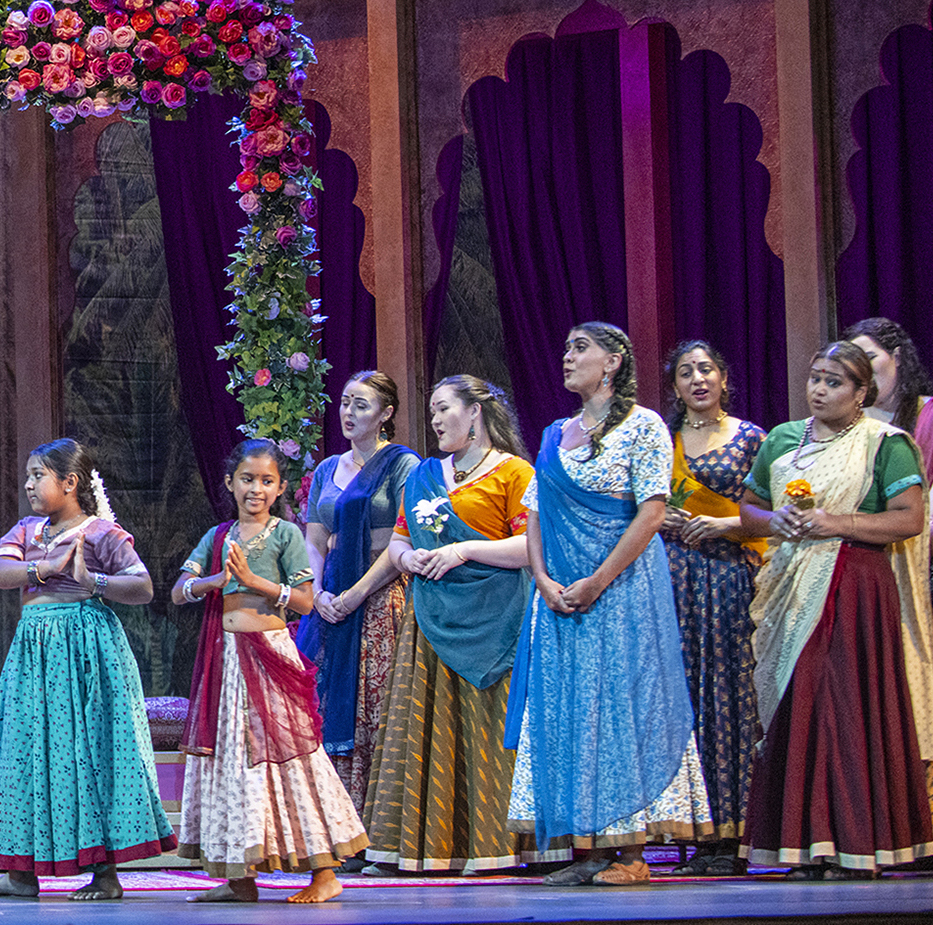Opera San José sat down with Artist-in-Residence soprano Melissa Sondhi to talk all things Romeo and Juliet, being the first recipient of the Wadhwani Chair for South Asian Artists endowment, and what it takes to tackle some of the most well known and demanding roles of the soprano repertoire.
OSJ: You have been a part of the OSJ family for several years.
Melissa: Yes.

Melissa Sondhi as Juliet and Joshua Sanders as Romeo / Photo courtesy of Valentina Sadiul
OSJ: You were a cover, and in the chorus, and now you’re a Resident. How does it feel now from when you first started with OSJ?
Melissa: It feels really good. This was, of course, what we all hope for when we start. I was just happy to be a part of the community and to be working at Opera San José, but they really saw me and saw my growth. I really felt like they did an amazing job of seeing where I was at and then giving me the next thing to challenge me. Then I rose to that potential, and so on and so forth, until I got here. I don’t feel like they ever gave me anything too quickly or that I wasn’t ready for. So it really is such a good company in that sense that it has fostered up-and-coming talent. I’ve worked with multiple general directors, and all three of them actually have that in common, so that’s rare. A lot of companies can say that they want to do that, but it’s very easy, especially as a soprano, to be lost in the mix. So it feels really excellent, and I feel very safe working with Opera San José because they will always see you right where you’re at and always give you just the right amount of challenge, which is how I feel about all of my assignments this season.
OSJ: How does it feel to be the first recipient of the Wadhwani Chair for South Asian Artists and to be a representative of your community?
Melissa: It is such an honor, and it is surreal because if you would have asked me even three, four years ago, if something like this would ever come around, I would have been like, maybe when I’m on my deathbed. It’s really wonderful. After doing Marriage of Figaro last season, it’s so smart of [Opera] San José to do, but it’s also necessary. How much talent did we have on that chain at that stage? It was incredible to see, and there are lots of Southeast Asian performers who are very worthy of this position. I’m just excited to see them continue to be represented by Opera San Jose.
OSJ: Opera San José has seen your growth from being in the chorus and covering Adele in Die Fledermaus to singing Barbarina in The Marriage of Figaro and covering Susanna and Nanetta in last year’s productions. What are you most excited about this next period of growth into these substantial roles within the soprano repertoire?
Melissa: Well, it’s good that I had some time to know about these assignments and just live with that. I had a celebratory period, and then I had an impostor syndrome period that was pretty paralyzing for a little bit, and then by the time I really got to work on them, I felt like I felt all the emotions that naturally would come with roles like this. Then I was like, “All right, now let’s just do it. I’m ready for it.” The cover assignments I’ve gotten recently have prepared me for learning roles of this length and caliber. I’m glad that I got to dip my toe in. Susanna was a big one because of the sheer amount of material. That one really helped me be like, “Okay, if I can memorize this and I can learn how to keep my stamina through this, I think I can do it with a lot of others.” This company has taught me how to kick it up the next notch. They’re so big that you just have to trust yourself and go.
With covering in the past, I had opportunities to do that, but I wasn’t able to do it every single day. Now I’m ready. After sweating the cover runs of Susanna and Nanetta recently, I’m ready now to be like, “I need to let me just trust myself every day.” That’s my next level of growth. Trusting my technique and my consistency. What I did over this past season prepped and mentally prepared me to be like, “I’m so tired of sweating my few moments as a cover. Let’s stop sweating. Let’s trust the sure.”

Melissa as Barbarina in The Marriage of Figaro / Photo courtesy of David Allen
OSJ: So, about all your preparation for Juliet, what is something that you find both challenging and rewarding about playing Juliet?
Melissa: Gounod writes the music so well to represent her growth, as she lives a lifetime in a matter of days. Not even a week.
OSJ: The original story is over five days.
Melissa: Five days! And he explores it so well. One of the things that I found challenging about that is starting at ‘Je veux vivre’ and then her growth to poison aria. I would practice them back to back, and I said, “I can’t do this, actually.” She is a different woman. Letting myself find that arc has been very
challenging but also really rewarding because it gets me into the character and into the music that much more deeply, and it makes so much sense. Then, the character can flow really naturally on its own. The build of his scenes and his music represent that extremely well. I actually went back to Heather Matthews. She’s the Chair of the Opera Department at SFCM. She worked with me a lot at the conservatory. I reached out to her for acting coachings on the arias, and she coached ‘Je veux vivre’ with me because I was like, “How do I just not make this a young girl? ” There’s a fire inside her that I want to bring out. Heather recommended I go back and just read the Shakespeare and speak it. It was like, “he also wrote this arc so well.” But people don’t hear it when just reading it in school. Many of us just read it in school, and some of us spoke it, but reading the whole thing was really clarifying.
OSJ: So you are preparing your three roles for this season simultaneously. What are some contrasting things you find in preparing a character like Gilda compared to Juliet?
Melissa: It’s tough because I’m loving through this process of Juliet at least, that Juliet, she says to Romeo in the balcony duet, “Hey, but if you don’t mean this, tell me now.” Right? “I’ll die of heartbreak, but let me know.” Yes, they make some very rash decisions and get swept away, but there’s a lot more logic to her than people think. I realized this when I went back and read the Shakespeare. Gilda doesn’t take a moment to ask, “Who is this man? Is he telling the truth?” So, I find her much more naive than Juliet, and that is what is tough. It’s interesting because of the way that their roles are written, ‘Caro nome’ is like the ‘Je veux vivre,’ but it also happens a little later. After she’s met him, after she’s fallen in love, she stays up in the clouds for the entire time. Juliet has her moments of being up in the clouds, but she is also emotionally intelligent and passionate with a purpose. Gilda’s just passionate. So that’s the challenge, I would say. [They] have very similar amounts of material and those things. People group them together because a lot of people will sing both roles, but they are very different.
OSJ: The final character you play this season is Rosalba in the Bay Area premiere of Daniel Catán’s Florencia en el Amazonas. What are you finding fascinating about working on a modern work?
Melissa: I love that Rosalba has a job. She’s a modern woman, but she’s in love as well. She has her own storyline in that sense. I love how it’s still lush, gorgeous music like the other two, but there’s a lot of modern truth to it. I don’t have to completely leave who I am in certain ways to become her. That’s nice to do from time to time. A lot of us who get into opera love the classics. We want to be those sorts of heartbroken heroines, but it’s also difficult sometimes to find your connection, a really authentic connection to a role. Rosalba is smart and has the complexities of the modern woman, and it’s just easier to step into her shoes.
OSJ: This is Opera San José’s first Spanish-language opera. How is it tackling the language in an operatic sense?
Melissa: Thankfully, I took Spanish from kindergarten to my senior year of high school. It feels really nice to return to it. It’s so nice to be speaking it again. I did some Spanish art-song at school but haven’t explored Spanish repertoire yet professionally. Now that my technique has settled so much, it’s one of the easiest languages I’m finding to sing in. There’s no doubling; there’s no glottal stops ever. I’m finding it even easier now than the Italian, and he [Catán] also wrote it beautifully. I really want to make sure that I do it justice because I’m not a native Spanish speaker, and this is not as far as my ethnicity; this is not my story really to tell. I want to make sure that my diction is really up to par. I’m excited that the Bay Area finally gets to see it.